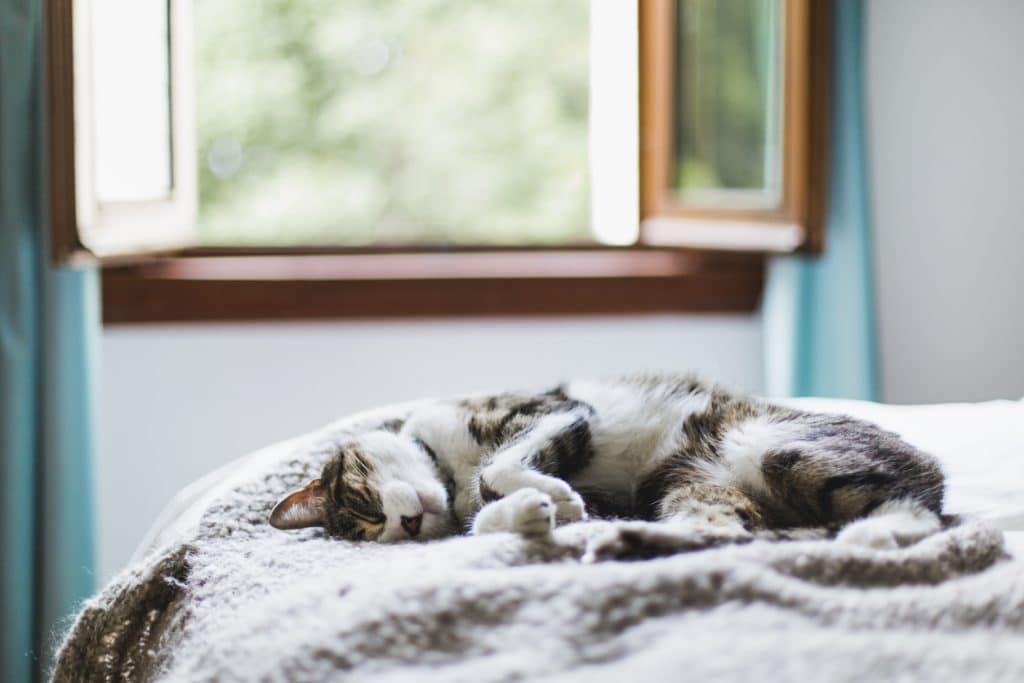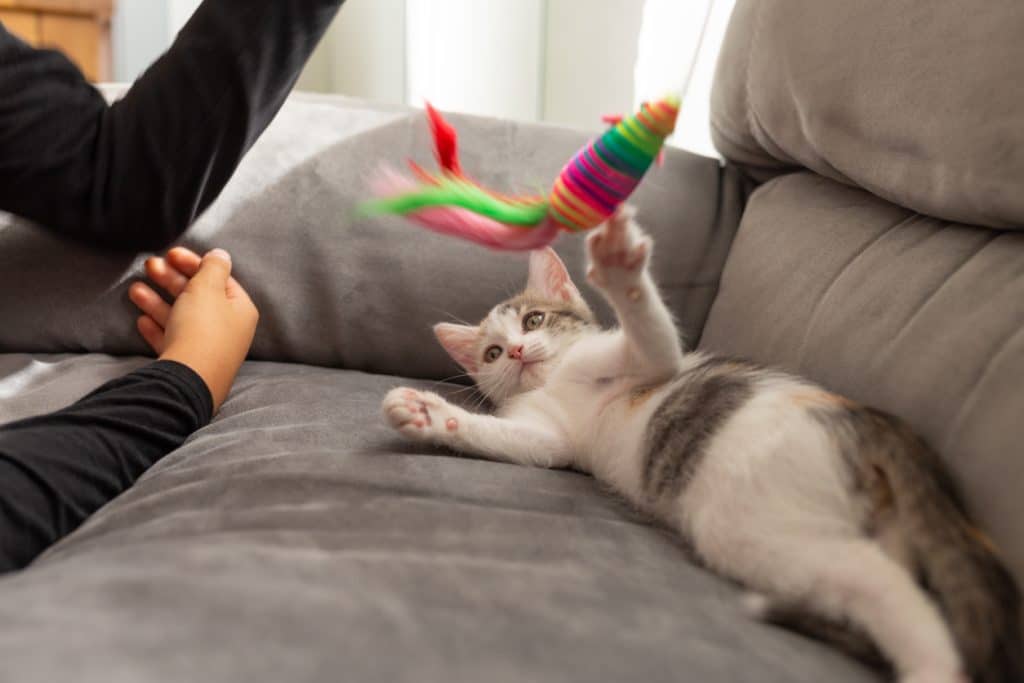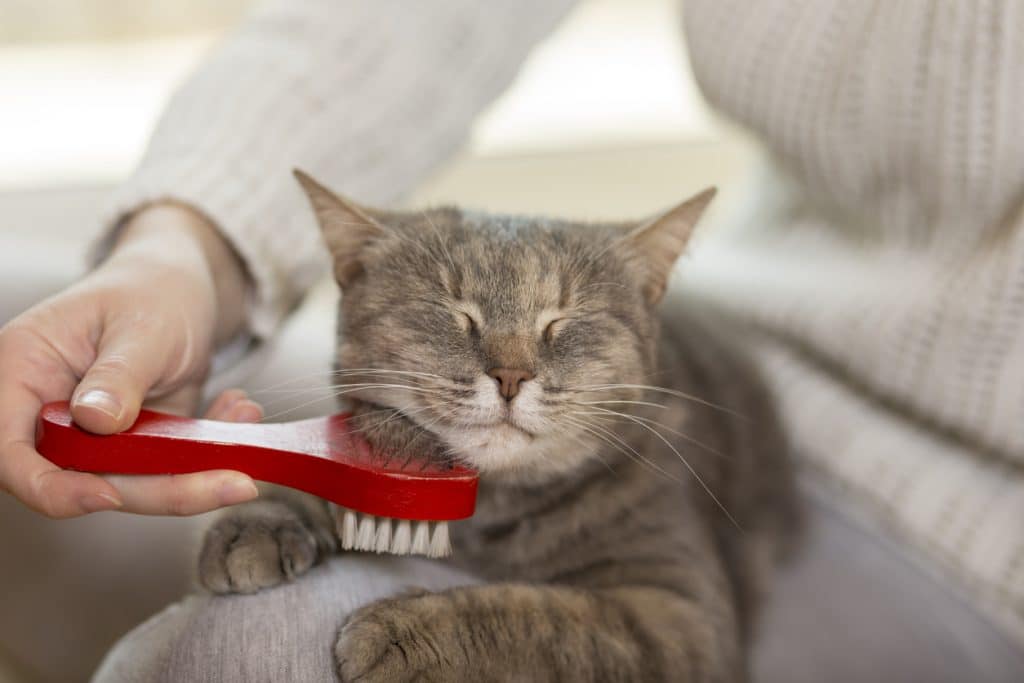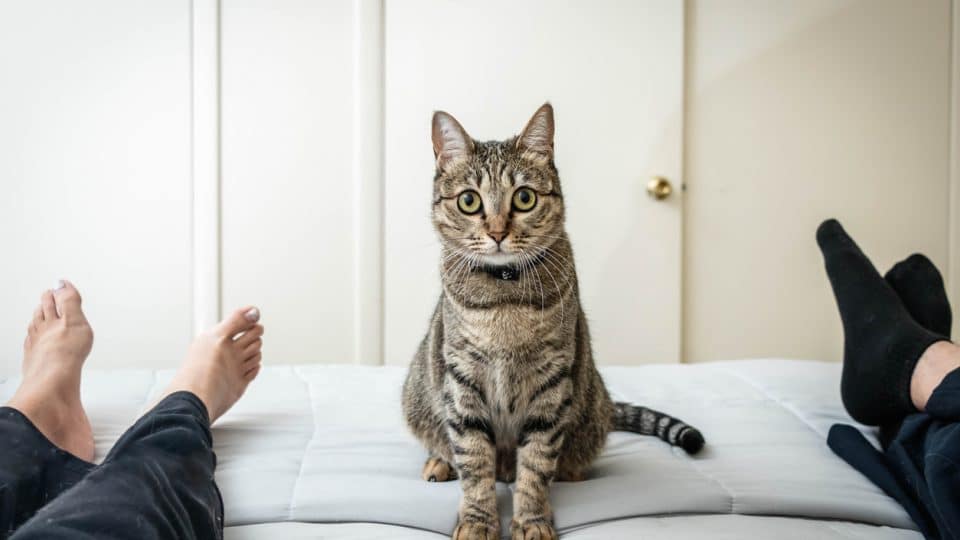Meowing, yowling, pawing at your face, and zooming about—all while you’re trying to sleep. “This is a problem that comes up a lot in consults with clients,“ Joey Lusvardi, Fear Free-certified feline behaviour consultant and owner of Class Act Cats tells Rover.
The problem we’re talking about—how do you stop those 4am kitty wake-ups? Stop letting your cat train you. Instead, train them, says Steve Dale, CABC, public pet speaker and author of Good Cat!
Training your cat to sleep at night doesn’t need to be complicated with these seven easy tips from feline experts. We’ll explore a cat’s natural sleep and awake cycles, and learn how to work with them to fit you and your cat’s lifestyle. Small tweaks in your schedule and how you interact with your cat could lead to a good night of sleep. But first, if the behaviour is new, visit your vet.

Image credit: Linda Raymond | iStock
1. Rule Out Medical Causes
Cats are notorious for hiding pain and illness, and a change in nighttime behaviour could signal a medical issue. A cat with a sudden change in sleeping behaviours—“that tells me there’s something else going on, and number one on my list is pain,” Dale says. But the feline behavioural expert isn’t a vet. That’s why he recommends seeing your trusted vet before exploring behavioural concerns or seeking advice from a certified animal behaviourist like himself.
“We do see a fair number of cats who caterwaul at night. The top reasons for those are hyperthyroidism, hypertension, and dementia,” explains Dr Shelley Knudsen, DVM at All Feline Hospital in Lincoln, Nebraska, USA. “When we see cats doing that, we first rule out hyperthyroidism and hypertension and make sure there are no other medical issues that might be contributing to the caterwauling.”
Other conditions keeping cats up at night include diabetes, arthritis, anxiety, dental pain, and kidney disease among others.
Pro Tip: The signs of pain, distress, or illness in cats can be subtle. Here are common signs of pain or illness in cats to look out for:
- sleeping more or sleeping less than usual
- overgrooming
- change in appetite
- defecating outside of the litter box
- urinating outside of the litter box
- difficulty or inability to stand
- decrease in mobility
- glazed expression
- dilated pupils
- purring when not socially engaging, playing, or eating
- panting or open-mouth breathing
- excessive drooling
- increase in aggression or irritability, including hissing, swatting and biting
- lack of grooming distinguished by a dull, matted, or oily coat
- excessive meowing, yowling, or caterwauling
2. Provide a Stimulating Environment
A bored cat is more likely to keep you up at night. A stimulating environment allows cats to express their inherent behaviours, reducing boredom.
Pro Tip: Provide your cat with scratching posts, cat trees, and perches to climb, scratch, and snooze on. If there’s a window for outdoor gazing, provide your cat access to the view. “For some added stimulation to reduce boredom in cats, leave out a food puzzle for your cat as well,” Lusvardi suggests. And when you plan to be away for an extended period, hire a sitter to play with and feed your cat.
3. Encourage Play Before Bed
Cats are hardwired to be up at dusk and dawn, but with stimulation throughout the day and before bed, they may be inclined to sleep through the night. Despite popular belief, cats are not nocturnal, they’re crepuscular. “Meaning they’re most active around sunrise and sunset rather than being awake during the day or at night exclusively,” explains Lusvardi. “Many of the small creatures that cats hunt, such as mice, are also crepuscular.” When cats don’t sleep at night it’s likely because their prey-predatory drive isn’t satisfied.
Pro Tip: To stop a cat from being awake at night, play with your cat in the evening just before bed in addition to regular daily stimulation. “Do one play session around sunset, or when your cat naturally seems to have more energy, and another one closer to when you are about to go to bed,” Lusvardi says.
A morning play session in addition to nighttime play might not seem like an obvious solution for a good night of sleep. But Lusvardi says morning play prevents daytime boredom and sets you up for success when bedtime rolls around.
To really satisfy your cat’s natural instincts, use a toy closely resembling prey, and follow the play session with a small snack. Play can look a lot different for a senior cat than a kitten, Dale adds. So, don’t be afraid to explore different types of play including interactive cat toys and cat puzzle toys.

Image credit: Elena Abrosimova | iStock
4. Feed Small Meals Throughout The Day and Before Bedtime
Replicate a cat’s natural eating cycle to prevent a grumbling tummy from waking your cat up. Feed two to three small meals a day with small snacks or a treat following play, preferably at the same times each day. This replicates a cat’s natural hunting and eating cycle, keeping them satisfied and asleep during the night. Plus, a late-night snack kickstarts your cat’s digestion, making them sleepy.
Pro Tip: Dale suggests placing food in various places around the house for your cat to find and incorporating food puzzles and games during mealtime. “Thinking, in some ways, can be just as tiring as physical exercise,” he says. “Mental stimulation in addition to physical exercise isn’t just important for cats—it’s a necessity.”
When it comes to sticking to a feeding schedule, Lusvardi says automatic pet feeders are a great solution. “If you can’t afford or don’t want to use an automatic feeder, you can employ a workaround by altering your morning routine by removing your waking up from being associated with the cat’s breakfast,” he adds. “Rather than feeding your cat right away in the morning, shower, get dressed, and make coffee. This creates a separation between you waking up and the cat being fed.”
5. Provide Separate Areas For Playing And Sleeping
Providing cats with their own spaces like cat beds and cubbies increases their confidence and overall wellbeing. In addition to providing them with their own space to sleep, reinforce a sleep schedule by providing access to certain furniture (like cat trees) or spaces only during the day and other furniture (like beds) and spaces only during the night.
Pro Tip: Setting boundaries with your cat can take some real tough love, Dale admits. Choosing to shut a cat out of the bedroom at night could cause them to sit and meow from outside the door. “And you can wait it out. It could take weeks,” Dale says. “But they’ll eventually get it.”
6. Spend More Time With Your Cat
“Cats are actually social animals,” Dale says. Specifically, they’re facultatively social—meaning cats have non-random relationships with preferred same-species or different-species individuals. Being away during the day and not allocating attention to your cat could lead to begging for attention at night.
Pro Tip: Grooming of preferred individuals is one important way cats show affection and bond with others, known as allogrooming. Replicate this behaviour by brushing your cat daily or a few times a week.
Play is also a great way to bond with your cat, and Lusvardi says that play sessions don’t need to be time-consuming. “Many people try to do a long, intense play session with their cat with the idea of wearing them out. While the logic behind that intuitively makes sense, it’s actually not what cats prefer,” he says. Just 10 to 15 minutes two to three times a day will keep your cat well-exercised and happy.
If you plan to be away from home, consider hiring a pet sitter. Even when a cat’s meals are automated, they’ll appreciate the social interaction.

Image credit: vladans | iStock
7. Don’t Reward Or Punish Your Cat
Punishing a cat for keeping you up at night can negatively impact the human-animal bond while rewarding them (with food or attention) reinforces the behaviour.
Pro Tip: “Don’t reinforce your cat waking you up in the night,” Lusvardi says. “That means don’t feed them, don’t play with them, and don’t yell at them. If your cat is seeking attention, yelling at them may actually end up reinforcing the behaviour.” Plus, Dale adds, cats don’t understand punishment. Instead, they may become fearful of the person doing the punishing. Yelling at them or squirting them with water is terribly unfair, he says.
Can I Give My Cat Something To Sleep At Night?
Yes, there are over-the-counter solutions and prescription medicines that may help your cat sleep through the night.
A vet may prescribe feline anti-anxiety medication or a prescription diet when there’s no indication of health concerns and changes in the environment or schedule are not helping your cat to sleep at night. But no medicine is one hundred per cent safe, Dr Knudsen says. Before considering a prescription to help your cat sleep, she recommends trying over-the-counter cat calming aids.
Vet-recommended over-the-counter calming aids that help your cat sleep include:
- Feliway pheromone spray
- Nestle Purina’s Fortiflora Calming Care probiotic
- Rescue Remedy for Pets
- catnip
When You Meet Your Cat’s Needs, They Will Let You Sleep
The bottom line: our happy house cats have wild roots that we can’t ignore. By learning more about a cat’s sleep cycle, social preferences, and prey drive, we can better cohabitate with our furry roommates. Altering your cat’s sleep patterns may not happen overnight, and your cat might never want to sleep in on Sunday morning. But with these tips, we bet everyone will be rewarded with a few more nighttime ZZs and a more fulfilling cat-human relationship.


